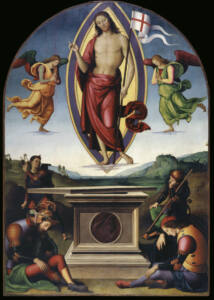
WelCom April 2024
Sue Jones
In the Old Testament reading for the Thursday after Ash Wednesday, Moses speaks to God’s people. He speaks about being good, of loving God and of keeping his commandments. If God’s people do this he says, ‘the Lord your God will bless you in the land which you are entering to make your own.’ In the Gospel Jesus speaks of the hardship of being his follower.
Lent has been a time of entering into the spiritual ‘land’ which is God’s domain. This place where we meet God can be somewhat strange to lay life. Special effort is required during prayer to enter this ‘land’ and become more a part of it, making it our own in a way that pleases God.
A background of personal prayer in which get to know God and to allow God to get to know us is a helpful thing to have on board when entering the Easter liturgies. Although these are familiar to us, they have at their centre a very strange event.
It is an event which will always be strange to us, an event which is hard to believe. It is the event of our Catholic lives and if we count ourselves as followers of Jesus Christ, we must allow his suffering death and Resurrection to shatter our thinking about how we are living as Catholics.
During Eastertime we need to make good use of the feminine virtues of trust and humility. These help us to become one with Christ who during his passion and death always sought his Father’s will. Again, personal prayer, time spent reflecting on God’s Word, will help us to contemplate the events taking place around us.
We move through the ceremonies we know so well and love so much more reflectively. We think more deeply about them seeking new knowledge of the actual events revealed in the Gospels. We sigh. We suffer. We slump. And we wait, wondering what on earth God is doing in that oh, so quiet, strange time between Good Friday and Easter Sunday.
But at last, the waiting is over and the explosion of the Resurrection is there before us. God makes what seems impossible, possible. When Jesus Christ rises from the dead are we there with him? Are we there in the midst of this time, feeling the confusion, the excitement, the hope and thrill of Easter morning? Are we open to receiving the movement of God’s Easter grace within us?
If we are with Jesus the accounts of his appearances, though familiar to us, will bring to us that Easter touch of strangeness so necessary in Catholic lay life. They will move our souls because they are moving stories. John and Peter running to the tomb having heard from the women that the tomb is empty. Jesus walking to Emmaus with those who do not at first recognise him, those who need evangelising. Mary Magdalene’s more contemplative story of recognising her Lord.
The total joy of the Resurrection comes from a strange, holy ‘land’ outside of ourselves. When we occupy this ‘land’ with God, and in God, joy bubbles up gloriously within us, bursting out of us into the liturgy, onto the altar, into the lives of those around us bringing hope and humour to the world. This is the movement of God’s Holy Spirit at work in us. It is the grace of Easter believed.
Sue Jones is a member of the Catholic Parish of Napier. She worships at Thomas More Church. She has written many published articles and scripture reflections for the New Zealand Catholic newspaper and the former Marist Messenger magazine.